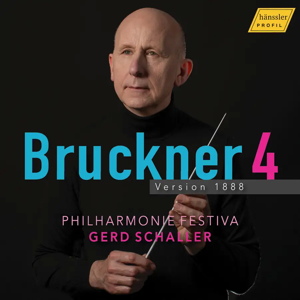
Anton Bruckner (1824-1896)
Symphony No 4 in E-flat major ‘Romantic’ (1888 version)
Philharmonie Festiva/Gerd Schaller
rec. 2023, Former Cistercian Abbey Church, Ebrach, Germany
Profil PH23086 [59]
Occasionally I find myself wondering whether a modern-day Bruckner would have been salesman’s dream with seemingly endless slightly different versions of the same thing to tempt the completist collector. The issue for those collecting this endlessly rewarding and fascinating composer is just how many versions of any given masterpiece you really need. Of course with Bruckner – and especially his Symphony No.4 ‘Romantic’ – we are not talking about different interpretations of the exact same work. A quick look at the discography for this symphony on abruckner.com here reveals some nine distinct versions either reflecting different compositional elements or editors. Best known and most recorded are the Nowak and Haas editions based on the 1878/1880 revisions. As a non-scholar I have to say I have always enjoyed this version a lot. That said, there is clear interest in the earlier versions which include literally different movements – notably the scherzo that pre-dates the famous “hunting” scherzo of 1878 and the discarded “Volkfest” finale. An aside: ah, the pleasures of Bruckner’s Symphony No.5 where the differences between Nowak and Haas are minimal and the composer provided no different versions so the listener can focus on the simple(?) question of the preferred interpreter.
So why do I find myself asking to review this recording – his third of different versions – by Gerd Schaller of the final/first published edition of 1888? Schaller’s Bruckner is always excellent in every respect. As a collector I am always hoping for a new insight into the extraordinary world of Bruckner. But if earlier versions of the symphony represented significant changes and major evolutions in the work, this 1888 published version feels more like tinkering with something that is already rather wonderful. For example, three very extraneous unexpected cymbal crashes have appeared in the finale. Certain phrases are extended/expanded, details of textures and harmonies altered. But in essence this is still the symphony as known in the more familiar 1878/1880 version. Academics and Bruckner acolytes might appreciate the amendments but I must admit that after a while I did stop trying to ‘spot the difference’. Even in the liner notes – which take the form of a conversation with Schaller – he says: “the intermediate and final versions may not differ so much”. Not that that has stopped this Bruckner bi-centennial, marked by Schaller completing his project of recording every single symphony variant.
Those familiar with Schaller’s previous multiple Bruckner discs will know what to expect. The Philharmonie Festiva are steeped in this performing style. The live performance at the Abbey Church in Ebrach is very well recorded, with a warm and wide soundstage, no audience noise and exceptional inner detail. The latter is clearly down to Schaller who manages the orchestral balances superbly well. Brass is rich and full but never dominant until key climaxes where Schaller unleashes their full power. String and wind figurations, too often submerged into an undifferentiated harmonic mush, register clearly and as such give the music a momentum and direction other performances lack. Here – as in his other performances – Schaller is a clear-headed, almost cool interpreter. By timings alone [this is a rough measure given editorial differences…] he is closer to the flowing Rogner than the more standard 65 minutes many conductors take let alone the ‘heavenly’ lengths of a Celibidache. Ultimately – and I really cannot quite put my finger on why – I find this is a performance I admire for its intelligence and high level of execution but it does not inexorably draw me into the drama of the work in the way other performances do. This may be because my introduction to Bruckner’s world was via the ebb and flow of Eugen Jochum’s two cycles, and that approach has rather imprinted on me.
A look at the abruckner.com discography makes it clear that there is not huge modern competition regarding this 1888 published version. Most of the previous recordings – none of which I know – are by giants of the Germanic music world from 75 years ago – Furtwängler, Knappertsbusch, Krauss, Walter, to name a handful. My guess about their choice of this edition was simply a question of practical availability of performing materials at that time. The Haas 1878/1880 edition dates from the 1930s (Nowak from the 1950s) but why it was not used in those early recordings I do not know. All that being the case, if you really must add this edition to your collection in a fine clear-headed performance in very good modern sound, then Schaller’s performance is pretty much the only sensible choice.
I think I have reached my fill of ‘new’ Bruckner editions … until the next intriguing one appears.
Nick Barnard
Previous review by Ralph Moore (May 2024)
Buying this recording via a link below generates revenue for MWI, which helps the site remain free.



















